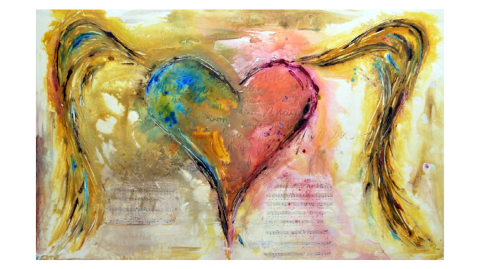And he received it at their hand, and fashioned it with a graving tool, and made it a molten calf: and they said, “These are your gods, O Israel…”
Exodus 32:4
In my sincere effort to engage the Bible as living Word, I am learning to pay attention to those sacred whispered that continue to grab me long after the Sunday sermon. My growing suspicion is that the Holy Spirit is still waiting for me to get the point in my own life and to actually do something about it. The emphasis that lingers in my mind this morning is the perpetual practice of god-making. Consider this a footnote to a previous message if you will; one which I am still preaching to myself.
In his work, Money and Possessions, Walter Brueggemann helps to reframe the scene between Israel and Aaron in Exodus 32 in such a way that really challenges me to reexamine the connection between our idolatry and our anxiety. We are told that the Israelites turned to Aaron once they grew tired of waiting on Moses, but what they asked of Aaron revealed a deeper fatigue; that is, they were tired of waiting on God. So out of that anxiety, they turned to Aaron and asked them to fashion them something new. Their perceived need was what Brueggemann describes as “a more palpable god.”
What an appropriate term for our current longing! Palpable—(adj) of a feeling or atmosphere so intense that it seems almost tangible. Plain to see or comprehend. Able to be touched or felt. You might say that somebody needed a hug...or at least an awkward elbow or fist bump. After months and months of social distancing from Moses (and presumptively God, too) Israel was ready to settle for whatever quasi-religious substitute they could find. “Come now, Aaron” they said. “You’ve got some catering to do!”
The tremendous insight of the text is that divine power was in this case equated with valued commodity. Aaron makes a god out of their gold who is credited with the exodus emancipation. Behold, these are your gods! And at that point, many might have objected, but no one could have possibly disagreed with the reality of that claim. It was a profession of faith, sad, but true.
As the story continues, the newly crafted god promises security and invites offerings and sacrifices. This has me thinking…then again, don’t they all? Watch television for an hour and count how many commercials will point you in this direction. Advertisements for retirement planning, camera systems to monitor your property and possessions, insurance policies to cover everything else that “matters most” while still saving you precious money, pharmaceuticals to stylishly alleviate our prognosis of pain (with only a few dozen side effects), cosmetic treatments to preserve the present image, gym memberships to become a ‘new you’ with new friends and without judgement, and testosterone boosters to restore whatever else that is apparently wrong with today’s society.
Again, the Bible’s portrayal of “bull worship” is not at all unfamiliar to us. Anytime divine power is readily merged with or confused with self-generating money and possessions, there is the same underlying request: make gods for us, who shall go before us. Whatever our insecurity of the moment, we’re looking for someone to come along and to fix it—and fast!.
And now they keep on sinning and make a cast image for themselves, idols of silver according to their understanding, all of them the work of artisans. “Sacrifice to these,” they say. People are kissing calves! (Hosea 13:2).
Brueggemann explains that such idols are “products of valuable commodities that are transposed into objects of desire and worship. They are without passion; they command or prohibit nothing. They are easy gods that make no covenant and that have on their horizon no neighbor. They cannot practice fidelity and have no transformative power” (p. 31). I thereby often wonder where all these ancient artifacts from Israel’s past would eventually land. In many cases a museum, perhaps, but in my case it is typically the garage, closet, or even a self-storage unit.
Whether God or god, our anxiety remains the driving force behind such fruitless acquisition. Which one of these commodities is going to protect me from the terror of the night or the unwanted influence of my neighbor? Which one will allow me to love myself more? Typically, the agent who can sell us on this fabricated image most convincingly—whoever assures us that our personal comfort and security is within reach—is the one who will get our vote. Those involved in the current shaping of our marketplace are counting on it. As models of discernment go, however, what a far cry this is from the One who taught us to pray to Yahweh, saying, thy will be done.
Realizing that we are all prone to be calf-kissing consumers at heart…and that try as we might, our souls still long for a more palpable god…how grateful I am for the Word that was elected to become flesh and dwell among us. How humbled I am to know that God was willing to take on human likeness in the person of Jesus, who obediently took upon himself the weight of our idolatry. In doing so, the hope (as I understand it) is that we might come, see, touch and feel not just the very presence of God, but also a glimpse of the Kingdom that is not of our own making.
This will bring something altogether new (and may require many changes along the way which frankly terrify me), but I must confess that I still long for that kind of an abundant community. I still believe that it can be so. I also believe it is worth the wait, worth the investment, and worth the engagement in the present body of Christ.
Where else do you find the “palpable” God?
Thank you, Jesus. Amen.
Grace to You,
Darren




